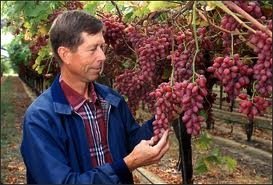For 38 years, Dr. David Ramming was responsible for breeding new varieties of table and raisin grapes and stone fruit for commercial production. For his important contributions to industry, which resulted in some 40 new fruit varieties, Ramming was inducted into the U.S. Department of Agriculture’s Hall of Fame on September 11 in Washington, D.C.
Ramming retired in January from USDA’s San Joaquin Valley Agricultural Sciences Center in Parlier, California. The Hall of Fame was established in 1986 to recognize agency researchers for their outstanding and long-time achievements in agricultural sciences and technology. Nominees must be retired or eligible to retire to receive the award.
Ramming, in working closely with the agricultural industry, helped develop 15 table grape varieties that now represent more than half of table grape production. He’s been credited with helping make mechanized raisin harvest a reality through his development of four raisin grapes that ripened earlier and could be grown on a large, overhead trellis, a key to the dried-on-the-vine grapes suitable for machine harvest. He also helped pioneer embryo rescue techniques that allowed for seedless by seedless crosses and shortened the table grape breeding timeline. A few of the stone fruit varieites he developed that became important to commercial growers included the Blackamber plum, Fortune plum and Galaxy peach.
Most recently, he worked to incorporate resistance to powdery mildew and Pierce’s disease into grapevines.
Two other ARS scientists were also inducted into the Hall of Fame: Dr. Rufus Chaney, agronomist at ARS headquarters in Beltsville, Maryland, and Dr. Sarah Hake, director of the ARS Plant Gene Expression Center in Albany, California.


Leave A Comment